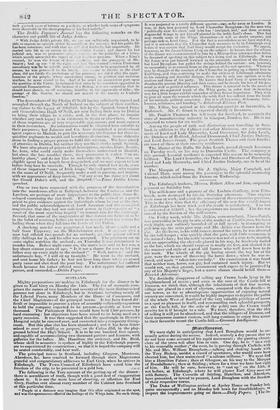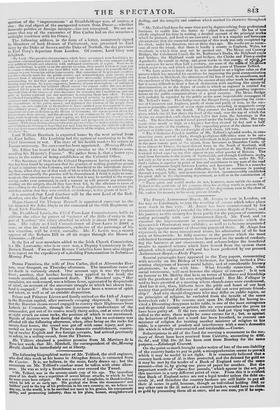111
We were right in anticipating that Lord Brougham would be un- usually active during the recess. Indeed, scarcely a day passes that we do not bear some account of his rapid movements ; the panting chroni- clers of the press toil after him in vain. One day, he is " on a visit to his venerable mother ;" the next, he is passing through Carlisle, with Mr. and Mrs. William Brougham,—talking and shaking bands with the Tory Bishop, amidst a crowd of spectators, who would once have cheered him, but then maintained " a solemn stillness." We next find him a Hamilton Palace ; then at Glasgow, on his way to the Marquis of Breadalbane's ; then at Stirling; where for a time we have lost sight of him. He will be sure, however, to " cast up " on the 15th, if not before, at Edinburgh, where he will plaster Earl Grey more sue with flattery. The Councils of Stirling, Hamilton, and Aberdeen, have presented, or intend to present, Lord Brougham with the freedom of their respective towns. The Duke of Wellington arrived at Apsley House on Sunday last, quite unexpectedly ; and on Monday left town for Strathfieldsaye,.to inspect the improvements going on there.—Daily Papers. (The in- spection of the " improvements " at Strathfieldsaye was, of course, a ruse: the real object of the unexpected return from Dover— whether domestic politics or foreign intrigue—has not transpired. We are not aware that any of the emissaries of Don Carlos had on this occasion a midnight interview with his Grace.]
The following address, in the form of a letter, numerously signed by Members of both Houses of Parliament, was presented to Earl Grey by the Duke of Sussex and the Duke of Norfolk, the day previous to Earl Grey's departure from London. Of course, Lord Grey was delighted.
My Lord—The peculiar circumstances which have occasioned your Lordship's re- signation—circumstances over which on had no control—will be ever remembered by our political friends and admirers with unfeigned sentiments of regret. Were we to suffer our feelings to guide us on the present oec tsion, they would lead us to urge you to resume a situation which you have tilled with so mueli hono tr to yourself and ad- vantage to your Sovereign and to your country. Hut, conscious of 'he personal sacrifiees you have already made for the public service, and acknowledging your claims to be
released from a situation which recent events have necessarily roistered painful and embarrassing. we feel that nothing short of a paramount necessity could justify our desiring your return. As warm supporters, however, of your Government—as unfeigned admirers of your short but brilliant official career—we cannot suffer this wra in your political life to pass by without testifying our esteem and admiration, and expressing our extaltatiou at the success of your measures for restating the Constitution, and our pride at having rendered von any assistance in carrying them into effect. To have established tranquillity at home. and given increased security to property—to have confirmed and continued the blessings of peace—to have enforced a right economy in the expenditure of the public money, and lightened the Muslims of the people nom taxation—are acts sufficient of themselves to have entitled your Government to more than ordinary praise. lint when to those set vices we are entitled W add the great and importaut 111V■ISUre of Refurin in the House of Commons, the emancipation of our fel- loiccreatures from slavery. and the extension of our commerce by t he opening of the India trade to private enterprise and capital, we feel assured that the aria or ■ our ad- minishation will rank as ono of the most brilliant anti iruspe,oits in the annals of our country. With every feeling ttfrespect for your private virtues is well as put licchmaeter, and in liking in the earnest hope that you may long live to enjoy the enviably n.ileetion that y on have successfully promoted the best interests of the empire, we beg to subscribe ouewlves," Lord William Bentinek is expected home by the next arrival from the East Indies. His Lordship had the option of confirming to be the Chief Governor or not. The state of his health renders his return to Europe necessary. No successor has been appointed. -Morning Herald.
Mr. Ellice has issued the following circular to the " Officers com- manding his Majesty's Forces." We gather from it, that a better sys- tem is in the course of being establishes at the Colonial Office.
" The Secretary of State for the Colonial Department having noticed to me, that has been found by experience that the practice of making gratuitous grants of land is injurious to the Colonies, and not beneficial to the individuals receiv- ing them, when they are of that rank of life to which discharged soldiers belong, and that consequently the practice will be discontinued. I think it right to com- municate this circumstance to you, in order that it may be notified to the troops serving under your command, in such a manner as will prevent any misunder- standing on the subject, should they have been led, by the allusions to cases of Wirt settling in the Colonies made in the Pension Regulations, to entertain the mistaken notion that they were entitled. on discharge, to free grants of land."
It is asserted that Lord Gardner will be the new Lord of the Bed- chamber, vice the Earl of Gosford.
Major-General Sir Thomas Reynell is appointed successor to the late General Sir John Doyle in the command of the 87th Regiment, or Royal Iri-h Eusileers.
Mr. Erankland Lewis, the Chief Poor-Law Commissioner, holds in audition the office by patent of "potter of the Bills of entry in the port of Iannlon," the salary attached to which is about 18410/. per an- num. His salary as Chief Commissioner of Poor-Laws is :WOOL a year ; so that his total emoluments, exclusive of the patronage of his new situation, will be 3:-;00/. annually. Mr. F. Lewis was a stanch opposer of the Reform Bill in all its stages through the House of Commons.—Herald.
In the list of new members added to the Irish Church Commission, is a Mr. Luscombe, who is or once was, a Deputy Commissary in the Barrack Board. Two or three Roman Catholics have been also slipped in to report on the expediency of upholding Protestantism in Ireland.—
Morning Post.

















 Previous page
Previous page